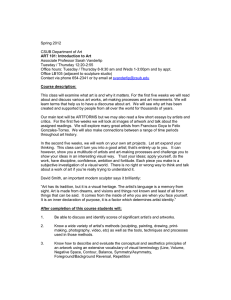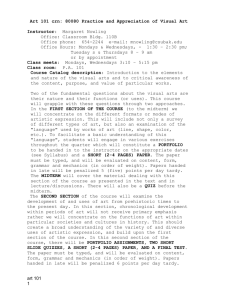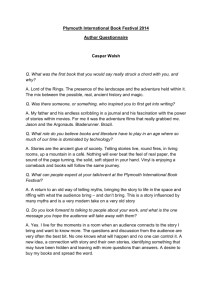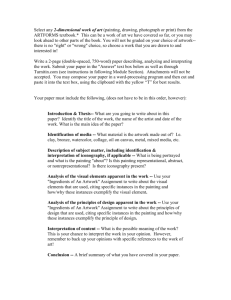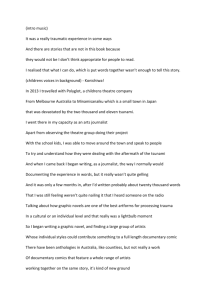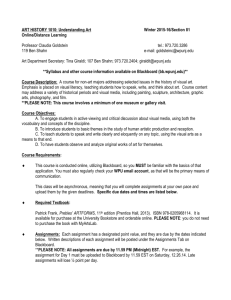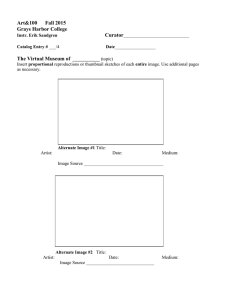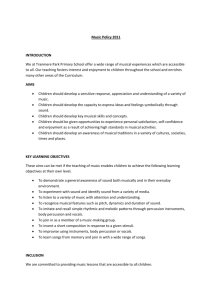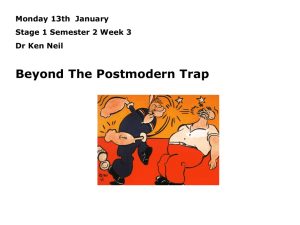20th century American Art
advertisement
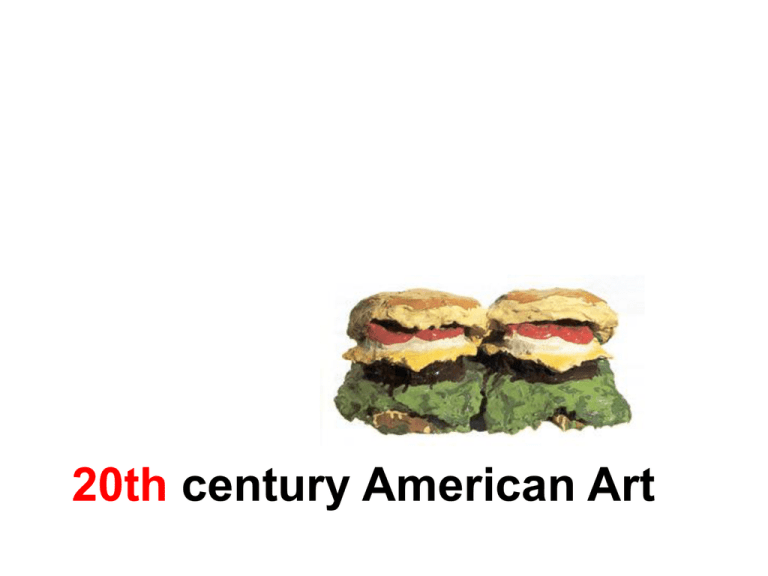
20th century American Art Pre-Modern Art in USA: American Regionalism • Art in American during 1920s, 1930s • Rejection of European art styles • Celebration of American values American Gothic by Grant Wood Early Sunday Morning by Edward Hopper Nighthawks Edward Hopper The Planting by Thomas Hart Benton Modern Art in America • Influences – Great Depression – World War II – Immigration of great European artists to America After World War II • New art of the 1950s • New York becomes center of art world • Abstract expressionism comes to America • Jackson Pollock introduces “Action Painting” Abstract Expressionism Woman and Bicycle by Willem de Kooning Action Painting • Type of abstract expressionism • Founder: Jackson Pollock • Influenced by automatism – unchecked self-expression • Emphasis on creative “act” of expression, not the result Jackson Pollock Number 8, 1949 by Jackson Pollock, 1949 Lavender Mist, No. 1, 1050 by Jackson Pollock, 1950 Pop art • Reaction against abstract expressionism • Named after British “popular” art movement • Featured images from popular culture, machine-made items • Andy Warhol: leader of movement 200 Campbell’s Soup Cans, 1962, by Andy Warhol (p. 461, ArtForms) Gun by Andy Warhol Marilyn by Andy Warhol Two Cheeseburgers with Everything (Dual Hamburgers), 1962. Plaster. By Claes Oldenburg (p. 461, Preble. ArtForms) “I am for Kool-Art, 7-UP art, Pepsiart, Sunshine art, 39 cents art…Menthol art…Rx art…Now art…I am for U.S. Government Inspected Art, Grade A art, Regular Price art, Yellow Ripe art, Extra Fancy art, Ready-to-eat art.” Claes Oldenburg, quoted from ArtForms, p. 460. Op Art • • • • • “Optical” painting 1960s manipulates line & color stimulates eye creates perception of movement Entrance to Green, 1970, by Richard Anuszkiewicz (p. 451, Understanding Art) Conceptual art • About ideas One and Three Chairs, 1965, (wooden chair, photocopy of chair, & definition of chair) by Joseph Kosuth (p. 464, ArtForms) Color Field Painting • • • • Large areas of color No obvious structure or focus Environments of color Usually very large paintings Blue, Orange, Red, 1961, 90”x81” by Mark Rothko (p. 442, Understanding Art) Photo-Realism • • • • Impersonal Highly realistic Influenced by photography Usually no narrative significance (doesn’t tell a story) Photo-Realism & Chuck Close Tourists 1970, fiberglass, by Duane Hanson (p. 474, ArtForms) Walk, Don’t Run 1976 installation by George Segal (p. 474, ArtForms) Earthworks & Site-Specific art • Usually sculptural • Large scale • Earth work: manipulates natural materials from the environment • Site-specific: designed for particular spot Spiral Jetty, 1970, by Robert Smithson. Great Salt Lake, Utah. 1500’x15’ (p. 466, ArtForms) Lightning Fields, 1971-79, 400 stainless steel 20’7” poles by Walter de Maria (p. 465, ArtForms) Running Fence, 1972-76, by Christo. 18’x24.5 miles. (p. 465, ArtForms) AfricanAmerican artists Rocket to the Moon, 1967, collage by Romare Bearden (p. 10, ArtForms) Feminist art • Influenced by female gender • Promotes gender-related issues • Sometimes uses female imagery The Dinner Party, 1979, mixed media, 48’x48’x48’ by Judy Chicago (p. 488, ArtForms) Guerilla Girls, 1992, Feminist Performance Art. (p. 489, ArtForms) Women & Dog, 1964, by Marisol (p. 458, Understanding Art) Performance art • Drama and art combined • Dramatic presentation by visual artist(s) • Presented before audience, sometimes unsuspecting and unaware • Not presented in formal theatrical setting The Social Mirror, 1983, Performance art with 20-ton garbage truck by Mierle Laderman Ukeles (p. 483, ArtForms) Swimmin’ the River, 1987--, 2552 mile swim, Performance art by Billy Curmano (p. 481, ArtForms) Folk Art • Art by untrained artists • Sometimes “visionary” Coke Bottle, by Howard Finster
